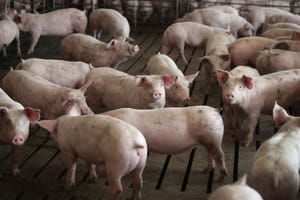Margo Andrae, CEO of Australian Pork Limited, says that since authorities uncovered the alleged breach in January 2017, APL had worked closely to support investigations.
August 14, 2019

Following a court decision against a West Australian pork business and two individuals, Australian Pork Limited issued a statement saying the organization strongly supports the sentencing and that the individuals’ “deliberate and long-term biosecurity breach for illegally importing semen for competitive advantage is a shocking violation of trust.”
GD Pork director Torben Soerensen, 39, and breeding manager Henning Laue, 74, were sentenced to 18-month and eight-month sentences respectively in Perth District Court on Tuesday for their role in smuggling Danish pig semen in shampoo bottles into the country. The Pinjarra producers told the court they began smuggling the semen into their operations in 2009 in order to introduce foreign DNA into their breeding program as Danish pigs produce more piglets per year than Australian pigs. The actions breached Australia’s biosecurity rules which require pig stocks to be “closed genetic herds,” meaning breeding using foreign genes is not permitted to prevent the spread of disease.
Margo Andrae, CEO of APL, says that since authorities uncovered the alleged breach in January 2017, APL had worked closely to support investigations.
“This producer’s actions openly flouted Australia’s strict biosecurity laws and had the potential to damage Australia’s $5.3 billion pork industry, as well as the livelihoods of more than 2,500 Australian pig farmers and 36,000 supply chain workers.
“At a time when Australia’s pork industry and the Australian government is focused on keeping out African swine fever as is spreads across the globe, it’s a timely reminder that it only takes one reckless producer to put the entire industry at risk.
“More critically, if foot-and-mouth disease was to get into the country, it would be catastrophic for Australia’s broader livestock production system with an estimated economic cost of $50 billion over 10 years.
“The actions of this business threatened to completely undermine Australia’s rigorous biosecurity measures and compromised the integrity, safety and value of Australian food production.”
Source: Australian Pork Limited, which is solely responsible for the information provided, and wholly owns the information. Informa Business Media and all its subsidiaries are not responsible for any of the content contained in this information asset.
You May Also Like



